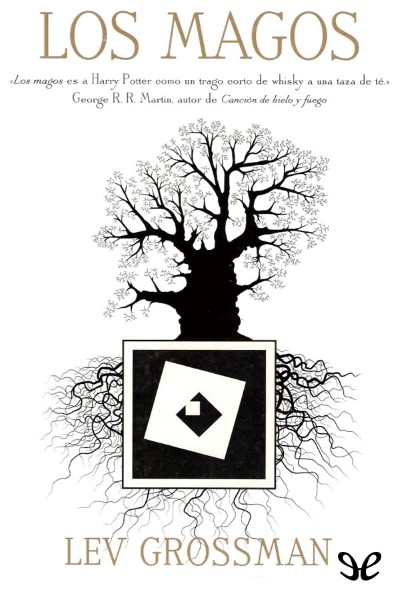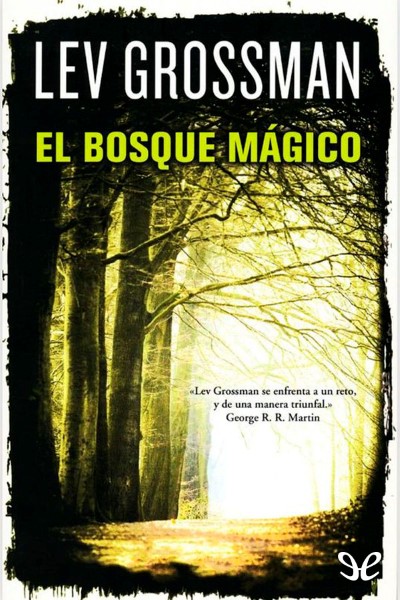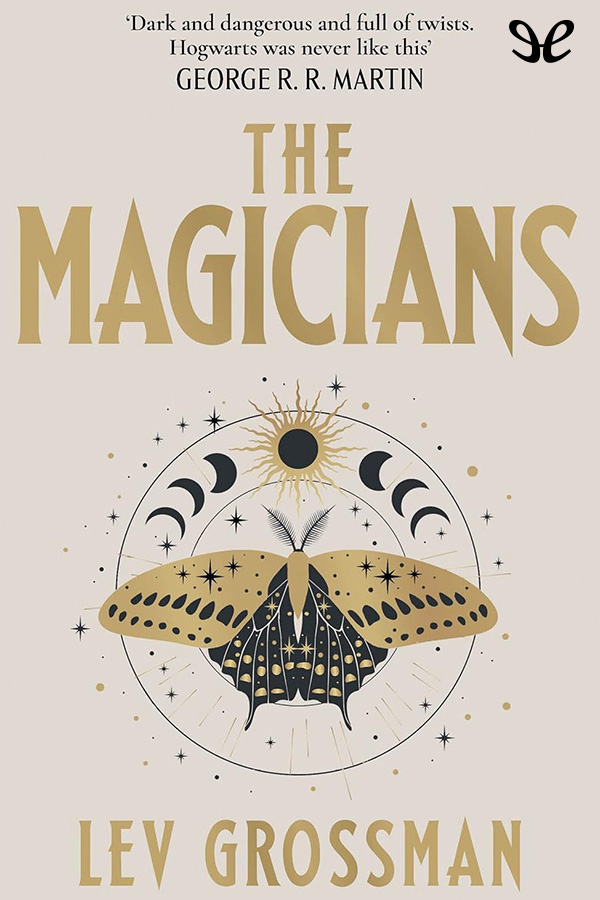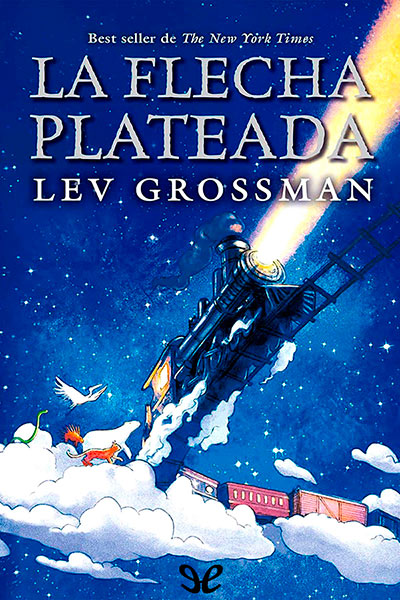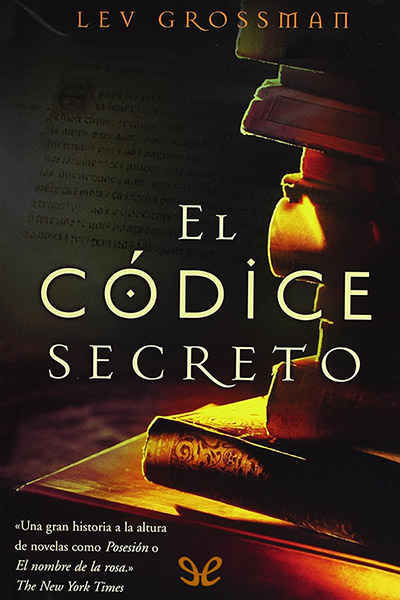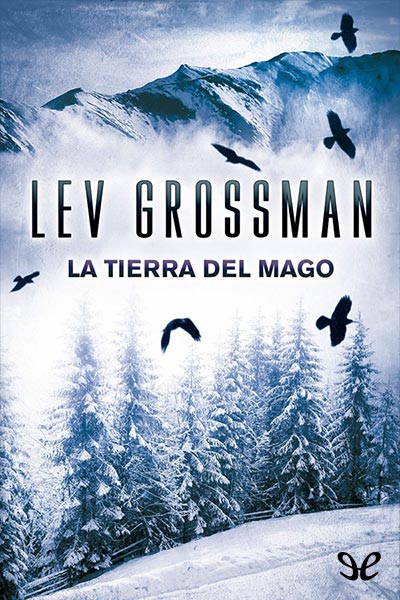oleebook.com
El Codice secreto de Lev Grossman
de Lev Grossman - Género: Ficcion
Sinopsis
Lev, Grossman Year: 2009
Descargar
Descargar El Codice secreto ePub GratisLibros Recomendados - Relacionados
Comentarios de lectores del libro El Codice secreto
Entretenido.
Autor del comentario: JOTAMAR
=================================
Autor del comentario: JOTAMAR
=================================
El libro que estaba escondido nos aporta un romance que nos atrapa.
Autor del comentario: CARLOSMANUEL
=================================
Autor del comentario: CARLOSMANUEL
=================================
Un libro entretenido pero sin m√°s.
Autor del comentario: NAHUI OLLIN
=================================
Autor del comentario: NAHUI OLLIN
=================================
La idea inicial es buena, pero se pierde en el juego y acaba por aburrir.
Autor del comentario: MONS12
=================================
Autor del comentario: MONS12
=================================
No me gustó. Genera un clima enigmático que no termina justificándose para nada. Me pareció pretenciosa, sin duda bien escrita, pero no genera emoción alguna.
Autor del comentario: MICKERY
=================================
Autor del comentario: MICKERY
=================================
Me defraudó y en ciertos momentos me aburrió. La trama enigmática que pretende crear al comienzo termina siendo poco convincente y hay ciertas partes que no están del todo justificadas. En su favor, diría que tiene buena prosa y una rica descripción de los personajes y lugares.
Autor del comentario: TRIZSA
=================================
Autor del comentario: TRIZSA
=================================
Buscaba un libro entretenido y lo encontré. No es una obra maestra pero está bien narrado y la historia consiguió engancharme. Se lee bastante rápido y el final me pareció que cerraba bien la historia, así que no le pido más.Yo sí que lo recomendaría a los amantes de las novelas de misterio. En mi opinión, si "El código Da Vinci" no se hubiese publicado, esta novela tendría mejores criticas... Las comparaciones son odiosas.
Autor del comentario: BLACKROSE25
=================================
Autor del comentario: BLACKROSE25
=================================
Entretenido, aunque se hace lento en ciertas partes. Se puede leer, sin grandes expectativas.
Autor del comentario: TAKISHELLAS
=================================
Autor del comentario: TAKISHELLAS
=================================
Una novela del absurdo. Varias tramas sin continuidad, mezcla sin sentido de realidad y sue√Īos. Ser√° que no la he entendido, pero me parece muy mala
Autor del comentario: MANUELFL62
=================================
Autor del comentario: MANUELFL62
=================================
Rese√Īas Varias sobre este libro
Here's the thing. I loved the story and the way it unfolded--at a leisurely pace, with moments of inspiration and excitement. The problem, however, is that the last couple of chapters build build build and FIZZLE. There were at least half a dozen scenarios that I could think of for the ending as I was reading up to it, and instead what I got was this uninspired, pat ending with loose ends left everywhere. I don't need everything to be resolved by the end, but really. The author couldn't have at least given us another chapter? Was there a deadline or a word limit or something? The whole thing left me cold and reminded me of how I feel when I read Michael Chrichton's books. Meaty and interesting plot & content (even if it feels a LITTLE it's cashing in on the DaVinci Code trend), highly unsatisfying ending. My rec: read this book until about 20 pages from the end, then stop. Whatever you imagine as the ending will ly be way cooler than what the author wrote.77 s Baba3,770 1,176
This is one of the many The Da Vinci Code type books published this decade, although this one's by a more established writer. I found this is an average thriller, with the 'draw' being that the Codex being sought after by the investment banker protagonist, sees him not just investigating literature and literary riddles, but also computer tech as well, especially games! One needs to be more than The Da Vinci Code to make one an interesting book! 5 out of 12, Two Star read.
2005 readthrills-spills-kills-oh-my58 s Irina DumitrescuAuthor 8 books34
I read this book on vacation, and so my brain was as relaxed as possible and as willing to be understanding. However, for the sake of full disclosure (and, hopefully, credibility), I am a graduate student in Medieval Studies, and I happen to have been taking a couse in the Medieval Book this semester, so that was my background while I was reading Codex.
I don't really need to repeat the comments of most of the people here -- that the plot is thin, the characters shallow, and that at best, the novel keeps you reading until the final, disappointing conclusion. I will say though that for the know-it-all tone that Grossman adopts, and considering that he brings in a medievalist graduate student to be even more erudite, his mistakes are glaring. (Some of these are factual mistakes that anyone with an acquaintance with the subject would spot, and some are logical mistakes that absolutely anyone would notice.)
I only remember one of them off the top of my head, and I can't check for more because I left the book in disgust at the hostel where I was staying. However, it's a notable example of the ignorance involved. Someone suggests burning the manuscript, and the main character says something , "It's vellum, not paper. It doesn't burn."
EXCUSE ME? Someone should have told that to all the vellum manuscripts that have been destroyed in fires over the ages... then they would have known that animal skin doesn't burn.
Look buddy, if your main character was an English major at Yale, even as an undergrad he would know that vellum burns, because they all know that the Beinecke is full of rare manuscripts and books, and they to tell you repeatedly (though incorrectly) how the air will be sucked out of the entire stacks in the case of fire. Also, he would know just a little more about books in general, ya know? 44 s Lightreads641 555
Young investment banker gets caught up in the search for a medieval manuscript that may or may not exist.
Ouch, this is not good. It's what appears to be Grossman's default protagonist: young white New Yorker dude who is deeply confused that his enormous privilege doesn't translate automatically to happiness. But his later fantasies have so much more muscle and richness to them. This thriller, by comparison, thumps blandly along to its dull conclusion.
That's actually one of the saddest things about this book. It flirts with the fantastical around the edges, but then withdraws to the banal with what looks a failure of courage. The protagonist plays a computer game, whose scenes and convolutions begin to parallel the quest plot in eerie and inexplicable ways. Inexplicable until explained, anyway, and not to get too psychological about this because I don't doing that. But man. There is a fantasy novel strangled to death inside this rigid thriller, and it's kind of terrible to watch it happen.
fiction28 s LENA TRAK129 125
This is by far the worst book I've ever read... I'm not an expert and I'm really sorry but this was a huge disappointment. At first it seemed quite promising. The first chapters were fast paced and quite intriguing I have to admit. However, there is nothing worse than a book which gets more and more boring as the story unfolds. It should be the other way around. When I finally made it to the last chapters I gradually regained my interest only find out that I had just read THE WORST ENDING EVEEEEER... It was a bad joke. Seriously of all the possible endings( even the predictable ones seemed better) this one was the unimaginably wrong. I was left with nothing... Not a single explanation, a thousand questions swimming in my head. This should be renamed to: How to destroy a catchy plot.fantasy mystery-crime-thriller24 s Blair1,864 5,288
Codex started so well, with a tone that reminded me strongly of Grossman's other novel, The Magicians. The book has one of those great beginnings that plunge you straight into the intrigue of the plot; from protagonist Edward's encounter with a strange couple, to his appointment with a client and subsequent acceptance - reluctant but instinctive - of a book-related quest, I was hooked within the first chapter. Scores of titillating details - Laura Crowlyk's archaic apartment building with its eccentric doorman, the coincidental appearance of the Went name and Weymarshe symbol everywhere Edward looks - add a touch of surreal magic to otherwise mundane events. And not only does Edward's adventure take in an ancient missing book and the family secrets of a dynasty of English aristocrats, we also watch him becoming obsessed with an unnervingly life virtual reality game called MOMUS.
Unfortunately, after this excellent set-up, the middle of the story is mediocre and the end disappointing. The purpose and meaning of MOMUS turns out to be a letdown; the codex's secrets similarly anticlimactic. The final twist is so muted you hardly notice it's happening. Margaret's initial account of the story contained within the codex is entrancing, but when the long-lost ending is finally explained, it's a damp squib. Eventually, most of the loose ends are tied up - but in a dull kind of way, and those that aren't are just maddening (what on earth was the Duchess's bizarre letter to Edward supposed to mean?!) The other problem is Edward himself. To my mind, the reader never really gets to grips with what makes him tick; we're informed of his 'pain' upon leaving Margaret behind, but the narrative never gives the impression that his feelings for her go much further than vague affection. His obsession with the Duchess isn't explained properly, to the extent that his decisions at the end seem completely out of proportion to his previous thoughts, and his friendship with Zeph seems out of place too - would a 'hotshot' young banker obsessed with work and money really choose to spend his precious downtime with a self-confessed computer geek? I couldn't shake the feeling that Zeph had been written into the story purely to facilitate Edward's introduction to MOMUS.
This book was first published in 2004, when Da Vinci Code fever was at its height, and you can clearly see that influence in the plot, the characters and even the cover design - though Codex is better-written and less sensational. If you loved The Magicians, chances are you'll enjoy this too; it's not as inventive, but it's a good read. It's just a pity the last two-thirds aren't anywhere near as engaging as the first.2000s-release mystery-thriller-etc19 s Kara Babcock1,991 1,434
If you were an investment banker before the 2008 recession, and you had just begun your first vacation in four years prior to moving from New York to a cushy new position in London, would you take on a job unpacking and cataloguing an ancient library for an elusive, eccentric, and extremely wealthy British couple who also happen to be nobility? That’s what Edward Wozny does in Codex, and it changes everything. On the surface, that seems it should be a good thing to say about a novel. Change—and specifically conflict—keeps things interesting. Unfortunately, Lev Grossman seems to have a knack for writing characters with whom it becomes difficult to sympathize, and Codex proves no different in this respect from his later efforts.
I’ve catalogued books before. During one of my summers working at the art gallery, I spent several hours a week in the tiny room that served as our library. It contained a diverse collection of arts books, catalogues from other galleries, newsletters and flyers announcing exhibitions from other galleries, and all manner of slides and film reels and bric-a-brac mouldering away. Armed, Edward, with a laptop and a cataloguing program and, Edward, lacking any experience in this field, I gamely went through the collection. I looked up books in online databases, estimated how much they might be worth for insurance purposes based on their condition and a search of used booksellers. I printed labels with Dewey classifications on them and stuck them to the spines before replacing the books on their shelves. It was an interesting experience, but it took a long time. And that tiny library is a lot smaller than the one Edward must tackle.
So I can understand Edward’s reluctance to get involved initially. And to some extent I can empathize with how he gets sucked into the task after that first day. But I don’t understand how, after he is dismissed, the hunt for a codex by Gervase of Langford still consumes him. Why is he still so obsessed with the Duchess? Grossman gives Edward an academic background in English, probably in an attempt to make Edward’s atrophied interests germane to the subject matter here. It’s not enough, though. Similarly, Edward’s newly found passion for the game that his techie friend Zeph passes on to him is unimpressive.
The problem here is simple: Grossman tries to emphasize that Edward is acting out of character. Yet we have met Edward so recently that we don¬ít have a good baseline for his character. So instead of internalizing this idea that Edward is deviating from his typical lifestyle, it just seems Edward is a massive idiot. And my opinion of him does not improve at any point in this novel. He consistently and constantly invites disaster by confiding in people or failing to act when action should have been taken. The entire fizzling, disappointing coda to Codex could have been titled, ¬ďWhy Edward Deserves to Fail¬Ē. At no point does he decide to take charge and do something his way.
Its black hole of a main character aside, Codex tries to be a thriller and just doesn’t work. Worse, it tries to be a literary thriller. This is no The Name of the Rose, an eminently superior book that Grossman name-checks with a bit of a pretentious literary wink. I don’t think Codex is trying to be The Name of the Rose, because it lacks any of the academic or philosophical depth that makes the latter such an amazing book. Nevertheless, Codex just isn’t very thrilling.
One reason is a lack of strong, nefarious antagonists. The Duke and Duchess are remote characters whom, aside from a brief cameo at the beginning, we never see. Moreover, Grossman tries to build the former up as this imposing person who should not trifled with, but he doesn’t even kill off a lackey. How are we supposed to find these people threatening? About the worst thing that happens is that Edward doesn’t sleep enough and fails to pack before his move to London. Oooh, so terrible. Where are the consequences here? Various people seem to insinuate that it isn’t easy to disentangle oneself from the grasp of the Wents once they have their cold, rich fingers closed around you. Yet at no point does Grossman ever do anything to demonstrate this is true.
And then we have the ending. Without going into spoiler territory, let’s just say that the eponymous codex puts in manifests in time. But, of course, Edward screws it all up even as he gets betrayed. We don’t really learn why he gets betrayed, nor do we get even a hint of the aftermath involved. Indeed, after all that sabre-rattling about how unpleasant his life would be if he failed at his task or displeased the Duke, the ending of the book makes it seem more Edward is just going to get let off the hook. But I guess we’ll never know.
Reading Codex wasn’t a waste of time. It provided a certain level of empty enjoyment. It’s clear that Grossman did some research here, and his love of literature shines through. Edward and Margaret’s conversations about medieval scholarship and speculations on Gervase of Langford were genuinely interesting. It’s these few redeeming qualities that make this book so disappointing. As with The Magicians and The Magician King , Grossman infuses the story with a highly sophisticated literary subtext—but he does so at the expense of the story itself, and that is problematic.
2012-read 2012-worst10 from-library ...more10 s Maciek569 3,575
Codex got great professional , with The New York Times comparing it and putting right next to The Name of The Rose. But when you read the "unprofessional" you'll see that it bombed and was panned practically everywhere, including this site.
I disd Grossman's The Magicians, but I decided to give him another chance since I already had the book. It was this title that made me interested in him, after all. The title caught my eye and the backcover caught my interest - a mystery involving a medieval manuscript that's somehow connected to an addicting videogame? SOLD!
Turns out I enjoyed Codex more than I thought I would, though largely because of the idea of it. Grossman takes many liberties with plot development and character actions (an investment banker organizing a private library? come on!) and some things are just too coincidential, particularly the parallels that start emerging between the virtual and real world.
I enjoyed Edward's struggle with his loneliness and work-centered life, though he seems to be rather stale throughout the whole novel. Grossman introduces new characters who pop in and out into his life and never seem to have any sort of real impact on him. I sympathized with Edward and his need to belong, and wished Grossman would develop the relationships between him and other people a bit more.
The game portions were what I was looking forward to, since I'm a game myself. I spent a great deal of my childhood playing, so the idea that a videogame is an important portion of the story really appealed to me. But MOMUS (that's the name of the game) is a game that's more a fantasy of one. Since Grossman writes a blog on technology I expected something fascinating but also realistic; something unique and compelling that I could imagine booting up on my PC. But the MOMUS sections seem to be written by someone who has no interest in gaming and whose last experience with computers was by watching the movie Hackers. The virtual reality portions aren't particularly original and lack detail - is it an FPS shooter? A MYST adventure? We'll never know, which is weird because Grossman is not shy about providing large infodumps about books and history.
I enjoyed the quiet tone of the book. The plot moves at a slow, leisurely pace and the events happen one after another, in any thriller, but there's never the feel of burning tension. Even though the book obviously rides on the coattail of The Davinci Code which was published only a year before, it's completely different in mood and style. The denouement in particular angered many readers but I enjoyed it as a quiet, fitting conclusion.
To sum up: Not bad as it might seem. Grossman is not the best writer in the world and Codex is not the best thriller, but I enjoyed it a lot more than his gloomy fantasy The Magicians. In the end, I can even say that I d it; even though it appears to be it's not a Dan Brown novel, and that's a good thing.read-in-2011 thriller-mystery-suspense9 s RonAuthor 1 book150
Interesting. Yes, it was an engaging story, well written. The reader is sucked tightly into Edward's mental struggles. But the conclusion--the very last pages--was as unsatisfactory as it was inevitable.
Edward stumbled through the story, the game, and life with little apparent engagement. It was his youthful bout of chess mastery: it came and went with little investment by him. He observed as much as acted it. Several times Edward admits being afraid, but he never acts afraid. He never changes his behavior.
Grossman's "hero" is an investment banker and, though the story involves nothing about investment banking, a metaphor lurks there for the type of person Edward is. His role in both the MOMUS computer game and the search for the codex is not much different. He spends a third of his life drunk or hung over and a third playing a computer game, and he doesn't seem to realize or care that he's burning up precious moments. Sure, he ends up with the money and the job, but not the book or the girl. If he's happy with that bargain--and the author hints that he is--he just confirms my low opinion: of him and the story.
But the reader must then answer the question, why did Grossman write this book, and why this way? I have no clue. And there are more engaging stories--not to mention life--to spend much time pondering it.This entire review has been hidden because of spoilers.Show full reviewgeneral-fiction8 s HesterAuthor 1 book14
This book took a long time to grow on me. This was partly due to the basic fact that most thrillers start out slow and then speed up faster and faster until you cannot put it down. The other part was that, early in the novel, he uses the phrase(if I can recall correctly) "very expensive grey handmade suit." Whenever a banker wears a handmade suit, it is costly. He did not need to use "expensive", let alone "very expensive."
My snobbery, though, came back to bite me because I spent a good hour being wary. That was the only egregious sentence in the book. The characters are different; most contemporary, good-looking investment bankers in literature have active social lives, rather than "never getting laid." Aspies are rarely heroes, unless it is the movie "Adam." And his portrayal of Margaret was so true that her behavior in the end was a total shock.
His depiction of academia was so accurate that I have a hard time believing that there was no author Gervase of Langford in the middle ages.
All in all, a very smart book with a heart and an understanding of how humans work. Rare indeed. american-writers great-britain non-genre-fiction ...more8 s Nastja 236 1,467
? ?????, ??? ???? ???????? ???????????? ?????, ????? ???????????, ?, ??? ??? ????? ?????????, ??????????? ?????? ???????????? ?????? ?? ???????????????, ?? ?????????????? ??????? ????? ? ????????????? ? ?????????? ???????, ? ???????, ??? ????? ?? ??? ?????? ? ?????????, ?????? ?????, ???????? ??????? ?? ? ?????????? ??? ???????? ????, ? ? ????? ????, ? ?? ????????? ??? ?????? ?? ?????????????? ??????????? ???? ? ?????????? ?????????? ???? ?????????, ????????????? ????????, ???????, ??????? ? ??????????? ?????, ????? ?????? ??? ????????? ? ???, ??? ????? ???? ?? ??????? ? ?? ???????, ?? ?????? ? ?? ????????????, ????? ? ????? ????????? ?? ????? ?????? ????.
?? ? ?? ???? ????? ????? ????? ??????????, ????? ?? ?????????????. addiction books_about_books conspiracy-and-paranoia ...more9 s Jorge GálvezAuthor 10 books172
Nuevamente nos encontramos ante un libro con trama de "manuscrito encontrado." Pero si esperan sorpresas, acción, intriga o alguna que otra persecución, ya pueden olvidarse de ello.
Este libro transcurre en una biblioteca en donde el protagonista, quien es un abogado adinerado, por alguna extra√Īa raz√≥n acepta pasarse sus vacaciones en la biblioteca de una pareja ricacjona buscando el manuscrito de un autor que al parecer es s√≥lo un mito.
Y ya. De eso trata todo. El manuacrito no es más que una novela de la edad media que no afecta para nada si es descubierto o no. También hay una trama paralela en donde el protagonista juega un videojuego. Y listo. Esa trama tampoco lleva a nada.
Uno de los peores libros que he leído en toda mi vida!
Autor del comentario:
=================================
